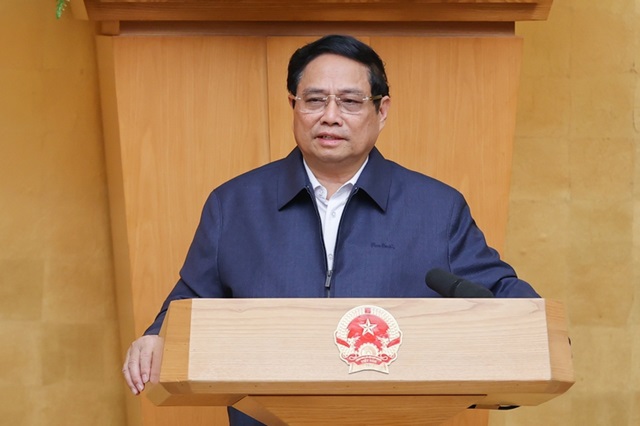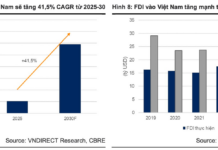On the morning of December 7, Prime Minister Pham Minh Chinh chaired the regular Government meeting for November 2024 with an agenda covering several important issues.
The meeting focused on discussions regarding: The socio-economic situation, the direction and management of the Government and the Prime Minister in November and the first eleven months of 2024, key tasks and solutions for December; draft Resolution 01 of the Government on key tasks and solutions for implementing the socio-economic development plan and state budget estimates for 2024, and draft Resolution 02 on key tasks and solutions to improve the business environment and enhance national competitiveness in 2024; and some other important matters.
 Opening the Government meeting on the morning of December 7, Prime Minister Pham Minh Chinh requested a target of approximately 7.5% GDP growth for the fourth quarter of 2024, with an overall growth of over 7% for the year 2024, and approximately 8% for 2025, to create momentum and set the stage for a double-digit growth rate in the period of 2026-2030. Photo: VGP/Nhat Bac
|
Boldly develop policies with a forward-thinking, expansive, and ambitious mindset
Concluding the meeting, Prime Minister Pham Minh Chinh assigned the Ministry of Planning and Investment and the Government Office to incorporate the comments and finalize the reports and draft Resolutions from the meeting, promptly submitting them to the Prime Minister for issuance. They were also tasked with refining the drafts of Resolutions 01 and 02.
Generally agreeing with the reports and opinions, Prime Minister Pham Minh Chinh provided a summary, stating that the socio-economic situation continued its positive recovery trend, with each month showing improvement over the previous one, and each quarter demonstrating higher growth than the last. Overall, the first eleven months achieved significant results, outperforming the same period in most fields.
Alongside these fundamental achievements, the Prime Minister pointed out the uncertainties and risks in the regional and international contexts, the significant challenges in macroeconomic management, the difficulties faced by some business sectors, the slow resolution of issues in the real estate market, and the hardships faced by a portion of the population…
Analyzing the reasons behind both the accomplishments and the shortcomings, the Prime Minister emphasized several lessons learned from practical experiences: It is crucial to closely monitor, accurately assess, and appropriately respond to situations, especially complex, sensitive, and challenging issues. Timely and effective policy responses, a strong focus on timing and intellect, innovation, and decisive actions at the right moments are key factors for success.
Given the limited resources, time constraints, and capacity challenges, it is essential to prioritize tasks and demonstrate high determination, great effort, and resolute actions. Clear delegation of tasks, with specific individuals assigned to each task, along with defined timelines, responsibilities, and expected outcomes, is imperative.
Regarding the increase in budget revenue despite tax and fee exemptions, the Prime Minister highlighted the lesson of removing constraints to facilitate production and business activities. By unleashing the potential of these sectors, revenue will naturally increase. Therefore, it is essential to boldly design and implement policies with a forward-thinking, expansive, and ambitious mindset, aiming for overall effectiveness.
Accomplishing all 15 targets for 2024
Outlining the tasks for the remainder of the year and the beginning of 2025, the Prime Minister stated that three major groups of tasks, including several complex and sensitive ones, must be addressed simultaneously. These include: First, focusing on accelerating and achieving the goals for 2024; second, reorganizing the apparatus to be streamlined, efficient, and effective, in conjunction with restructuring and improving the quality of civil servants; and third, conducting an end-of-year review for 2024 and developing the plan for 2025.
The Prime Minister set the goal of accomplishing all 15 targets for 2024, aiming for approximately 7.5% GDP growth in the fourth quarter and over 7% for the entire year. To maintain this momentum, he targeted a growth rate of around 8% in 2025, setting the stage for a double-digit growth rate in the 2026-2030 period.
Reduce internal units by at least 15%
The Prime Minister identified 11 key tasks and solutions, emphasizing the need for their synchronous, resolute, and effective implementation, in line with the resolutions, conclusions, and directives of the Central Committee, the Politburo, the Secretariat, the National Assembly, the Government, and the Prime Minister.
Particular attention should be given to intensively focusing on the conclusion of Resolution No. 18-NQ/TW and promoting the reorganization of the apparatus to be “Lean, Compact, Strong, Efficient, Effective, and Capable.” It is crucial to foster unity in thought and action and successfully implement the Government’s plans and orientations for reorganization. The ministries and sectors are expected to reduce their internal units by at least 15%.
The Prime Minister requested that, starting next week, time be prioritized for apparatus reorganization. The Government Office was instructed to arrange meetings for the Deputy Prime Ministers in charge of each sector, according to the Prime Minister’s assigned areas of responsibility.
Achieve approximately 15% credit growth
Additionally, it is imperative to consistently prioritize the goal of promoting growth while maintaining macroeconomic stability, curbing inflation, and ensuring major balances.
The monetary policy should continue to be proactively, flexibly, timely, and effectively administered, in coordination with a reasonable, focused, and prioritized fiscal policy, along with other policies.
Regarding monetary policy, the State Bank of Vietnam will focus on stabilizing exchange rates and the foreign exchange market, ensuring convenient access to credit for production and business activities, especially in priority areas. Efforts will be made to reduce lending rates, with a target of approximately 15% credit growth for the year.
Remove obstacles to unblock and effectively utilize resources from the stock market
The Ministry of Finance, along with other ministries and sectors, according to their functions, tasks, and authority, should promptly address obstacles to unblock and effectively utilize resources from the stock market, corporate bonds, project bonds, and reduce dependence on bank credit.
Reduce value-added tax by 2%
In terms of fiscal policy, the Ministry of Finance will continue to strive for increased revenue and economize on regular expenditures. They will promote digital transformation and the application of electronic invoices, aiming for over 15% revenue growth in 2024. The Ministry will also implement policies for tax, fee, and charge exemptions and reductions, and consider extending these policies into 2025.
The Ministry of Finance will take the lead, in coordination with relevant ministries and agencies, in submitting to the Government a Decree on reducing value-added tax by 2% as per the National Assembly’s resolution.
Strive to complete 3,000 km of expressways and over 1,000 km of coastal roads by the end of 2025. The Ministry of Construction will prepare to host a conference on promoting the development of social housing and reviving the real estate market.
Address obstacles in legal documents
Actively and effectively implement the laws and resolutions passed by the National Assembly at the eighth session. Promptly issue guiding documents, especially for the Law on Public Investment (amended), the Law amending and supplementing a number of articles of 4 laws, and the Law amending and supplementing a number of articles of 9 laws…
Continue to focus on reviewing and proposing solutions for mechanisms, policies, and legal provisions that are still inadequate. Report to the Steering Committee for handling obstacles in legal documents.
Continue to resolve long-standing issues, the State Bank of Vietnam will urgently finalize a solution and propose breakthrough measures for the handling of SCB.
At the same time, refine the draft Resolution 02 with a spirit of untying knots for businesses and promoting the mobilization and attraction of resources from the private sector and public-private partnerships. The highest priority is given to promoting growth and achieving targets related to GDP growth, per capita income increase, labor productivity improvement, enhancing the material and spiritual life of the people, and elevating the country’s position.








































